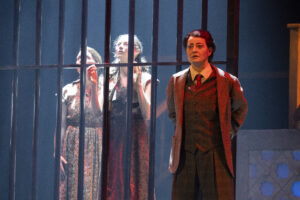The art of opera was born in 16th-century Italy, combining the visual spectacle and rich storytelling of theatre with striking emotive soundscapes of intertwined voice and orchestra. Opera was historically an elitist art form, presented in dazzling theatres frequented by society’s snobbery. Subsequently, opera has gained notoriety as being a pompous overblown affair showcasing gaudy costuming and incomprehensible, glass-shattering sopranos.
Fortunately, modern artists and production companies have carried the art into the present day, creating memorable contemporary stories with stunning music, dance, and voice. Ainadamar (meaning “fountain of tears” in Arabic), written in 2003 by Argentinian composer Osvaldo Golijov and presented by Pacific Opera Victoria, is a prime example of this.

Unique to Ainadamar compared to Italian operas of antiquity is the inclusion of Spanish flamenco dance and lyrics. Some of the most breathtaking scenes feature the strong, emotive staccato rhythms of whirling tap dancing, underscored by the strange, haunting score (conducted by Giuseppe Pietraroia) that seems to evolve classical music into an entirely new genre of sound.
Set during the Spanish civil war, Ainadamar tells the story of revolutionary queer playwright Federico Federico García Lorca (Hanna Hipp), who was captured and executed for “crimes against Spain.” Lorca’s muse, Catalan actress Margarita Xirgu (Miriam Khalil) recounts events 40 years prior, when she adopted Lorca’s portrayal of Mariana Pineda, a woman executed for refusing to give up the names of revolutionary leaders, including Lorca.
Throughout the production of Ainadamar, the viewer witnesses flashbacks of Xirgu’s life. The talent and chemistry between Khalil and Hipp is powerful, supported by a robust cast of characters who depict the innocent civilians caught in the midst of a powerful political conflict. As an added touch of authenticity, during the pre-show mingling, actors dressed as beleaguered 1940s civilians in shabby clothes walked amidst the audience, carrying suitcases and a hauntingly sad demeanour, as if waiting for a train that will never arrive. The significance of this only became apparent to me much later in the production.
Khalil’s vocals and performance paint an immaculate portrait of a woman weathered by years of grief and remorse, doomed in dedication to keeping alive the ghost of the long-slain Lorca through endlessly enacting his plays. Even near death, she’s still committed to performing until her last breath. At her side is her chambermaid Nuria, whose introduction is unassuming as she silently assists her mistress for several minutes. When she finally finds her voice, grieving as Xirgu doggedly performs from the past into the grave, I was startled at the power within her small frame, evoking intense emotion with her voice alone.
Making brief but commanding appearances is Alfredo Tejada as Ramón Ruiz Alonso, a falangist dictator who spreads lies and dissent among the revolutionaries, calling for Lorca’s execution. Standing in military garb atop an imposing tower, Tejada’s vocals are wild and unhinged, shrieking for the capture and death of Spanish revolutionaries. The uncontrolled nature of his vocals shocks the viewer, as we’re conditioned to expect poised and refined perfection from artists, but this choice is brilliantly intentional, mirroring the unstable insanity of Alonso.
Visually, the set of Ainadamar is stunning, featuring a combination of shifting set pieces accentuated by layered back- and front-projected screens, most notably casting incredible imagery atop a translucent curtain, behind which the actors undulate.
The production closes with the pristine image of dozens of citizens, dressed in white, carrying white suitcases… including Lorca and Xirgu. This recontextualizes the travellers seen earlier in the lobby, whose aimless paths and vacant, sad expressions foreshadow that perhaps these spectres wandering among us were not fleeing refugees, but ghostly echoes of lives abruptly ended.
The staggering artistry and talent involved with bringing Ainadamar to life is unbelievable for a show that only spans four performances, and I hope they bring it on the road so that others may also witness this incredibly impassioned production.
Ainadamar
Various days and times, until Tuesday, February 27
Various prices, Royal Theatre
pacificopera.ca
Correction: We originally stated that Federico Federico García Lorca and Margarita Xirgu were lovers, which is incorrect. We apologize for the mistake.
